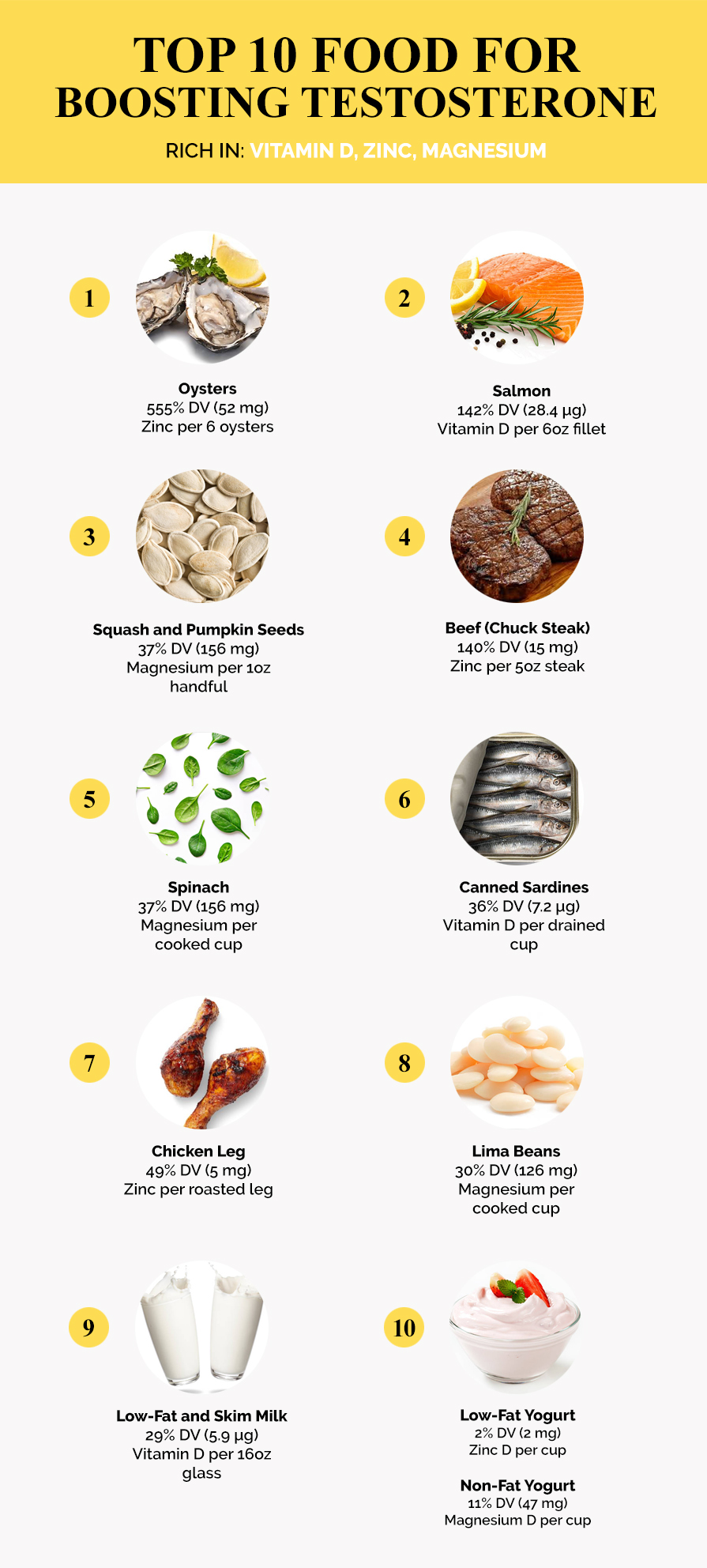CATERGORY: BOOST TESTOSTERONE
Testosterone Boosting Foods & Supplements
Foods high in Magnesium, Vitamin D, and Zinc support testosterone production. The most nutrient packed foods for this are oysters, salmon, squash and pumpkin seeds, beef, spinach, canned sardines, chicken leg, lima beans, low-fat milk and yogurt.
Vitamin D - A 12-month study found that supplementing with around 3,000 IU of vitamin D3 per day increased testosterone levels by around 25%.
Ginger - A study in infertile men found that ginger boosted testosterone levels by 17% and increased levels of other key sex hormones over a 3 month period.
Tongkat Ali - A 1-month study in 76 older men with low testosterone found that taking 200 mg of tongkat ali extract per day significantly increased levels of this hormone to normal values in over 90% of participants.
D-Aspartic Acid - Research has found that as little as 12 days of D-Aspartic Acid supplementation seems to increase luteinizing hormone as well as testosterone production and transportation around the body.
Tribulus Terrestris - One 90-day study in men with erectile dysfunction found that taking Tribulus improved self-reported ratings of sexual health and increased testosterone levels by 16%.
Fenugreek - A comprehensive study tested two groups of 15 college men over an eight-week period. All 30 participants performed resistance training four times a week, but only the participants in one of the groups received 500 mg of fenugreek per day. Both free and total testosterone levels increased in the Fenugreek group, whereas the group that only weight trained actually experienced a slight decline. Those who took fenugreek also experienced a greater increase in fat loss and strength.
DHEA - Several studies have found that 50-100 mg of DHEA per day can boost testosterone levels by up to 20% when compared to a placebo.
Elevated cortisol (stress hormone) levels suppressed the production of testosterone. The following foods and supplements help decrease cortisol levels which in turn leads to higher testosterone levels.
Dark Chocolate - Two studies of 95 adults showed that consuming dark chocolate reduces cortisol response to stress.
Fruits - A study of 20 bicyclists showed eating bananas or pears during a 75-km ride reduced cortisol levels compared to drinking water only.
Black and Green Tea - A study of 75 men found 6 weeks of drinking black tea decreased cortisol in response to stress, compared to drinking a caffeinated placebo.
Probiotics and Prebiotics - Probiotics are friendly, symbiotic bacteria in foods such as yogurt, sauerkraut and kimchi. Prebiotics, such as soluble fiber, provide food for these bacteria. Both probiotics and prebiotics help reduce cortisol.
Water - Dehydration increases cortisol. Water is great for hydrating while avoiding empty calories. A study in nine male runners showed that maintaining hydration during athletic training reduced cortisol levels.
Fish Oil Supplements - Supply omega-3 fatty acids which reduce cortisol.
Ashwagandha - Clinical research indicates that taking 300 mg twice daily after food for 60 days reduces perceived stress levels by 33% to 44% and decrease cortisol levels by 22% to 28%.
Tongkat Ali - A 1-month study in 63 adults with moderate stress found that supplementing with 200 mg of tongkat ali extract per day reduced levels of the stress hormone cortisol in saliva by 16%, compared to those who received a placebo.



